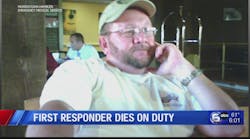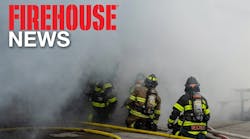Let me begin this visit with you by making an apology to the Beatles. In pursuit of leadership success in the fire service, I have hijacked the title of one of their hit songs. I am referring to the 1967 Beatle's hit song, "All You Need is Love." Hopefully the remaining members of that legendary quartet will forgive me for the use of their words in an education endeavor.
The idea behind this week's visit with you came to me quite suddenly. As is my way, I was reclining in my thinking chair on the front porch of my home here in Adelphia when the creative juices began to flow within a cloud of aromatic cigar smoke. It was my good fortune to be able to spend the better part of a very raining afternoon preparing for a doctoral-level course in leadership which I am facilitating for Capella University in Minneapolis during the summer quarter of this year.
After teaching several quarters of courses in our public safety program which revolved around the world of the National Incident Management System (NIMS), it is indeed a pleasure for me to be able to return to a world with which I am most intimately familiar: leadership. As you all should know by now, leadership has been one of my primary research and writing subjects over the past decade since I retired from the Newark Fire Department back on June 1, 1999.
As I was reading through one of the two texts for the course, I came across a phrase that caught my eye. It was a simple statement, but its meaning leapt off of the page for me. Kouzes and Posner (1987) claim that love is the secret of leadership success.
Suddenly all sorts of weird visions began to run rampant through my brain. My first urge was to begin writing a fictional book entitled Lust Under the Ladder Truck. My thoughts next turned to creating a movie entitled, Pump Operator's Paradise. I actually had to put the book down and repair to the kitchen for a fresh cup (pot) of coffee.
Fortunately, I was soon able to reign in my imagination and return to the world of knowledge and education. Upon further reflection the authors of the text defined love as, "...encouragement, loyalty, teamwork, commitment and respect for the dignity and worth of others" (Anderson, et al, 2006, p.53).
These authors go on to claim that, "...it (love) is an affair of the heart and not of the head" (p.53). I frequently cite Biblical sources as the basis for how far back in history love goes. One of the great messages about love comes from the Book of First Corinthians. "Love is patient, love is kind. It does not envy, it does not boast, it is not proud. It is not rude, it is not self-seeking, it is not easily angered, it keeps no record of wrongs."
Anderson, et al, (2006) provide an undated version of this verse, one more in line with the way we think and speak today. Part of it goes on to state that "...love doesn't strut; doesn't have a swelled head; doesn't force itself on others; isn't always 'me first'; doesn't fly off the handle; doesn't keep score of the wrongs of others; doesn't revel when others grovel (and)...never looks back but goes on to the end" (p.53). My friends, I believe that this is a terrific modern version of that classic Biblical exhortation.
Like many of you who have a great deal of seniority within the fire service, my initiation into the fire service came at the hands of a great many World War II and Korean War veterans. These folks had come up the hard way, by living through the Depression and World War II. Many of them had earned their spurs in actual, mortal combat. Heck, one of my chief's had a scar from an enemy soldier's bayonet on his side. He used to regale us with stories about how the man who did that to him died a short time later at his own hands.
These folks had been taught their craft as firefighters by people who hadn't allowed much in the way of commentary and practically nothing in the way of individual feelings and dissent. During our lessons under these folks, we were taught to do what we were told, no questions asked. I can only imagine the reception I would have received from my first captain in the Newark Fire Department if I had asked him about his love for me and the other guys.
Let me suggest that the sort of love alluded to by the authors of the text I am reading is not the stuff of romance novels. It is the type of behavior one might envision when speaking of the "Golden Rule." They are suggesting that a leader must identify the motivators in the lives of their followers. They must identify the needs of their folks and create ways in which those needs can be met by the fire department organization, its members, and its leaders.
In essence, these authors are proponents of the transformational style of leadership. Within this theory leaders are taught to identify the needs of their followers and then work to create an organization which meets those needs. My research, as supplemented by decades of personal experience, has long suggested that people whose needs are met tend to work harder on behalf of their organization.
Each of the topics discussed in the text agree totally with those things which I have written about and lectured on for the better part of the last two decades. I would suggest that they allude to the Moral Compass topics which I have taught to students around our nation. Quite simply, the leader should seek to develop the following tools for their leadership toolkit:
- Honesty
- Integrity
- An awareness of their own strengths and weaknesses
- The ability to recognize and compensate for their limitations
- Good communications skills
- Empathy
- The ability to coach and counsel others in the organization
- The ability to recognize and solve problems
- The ability to accept criticism of all kinds
- The ability to bring people together in a positive way to advance the vision of their organization
- An awareness of the importance of a positive, optimistic attitude
I am not sure about you, but these are the attributes which I love to see in people with whom I am working as a firefighter, educator, or trainer. They also appear frequently on the lists which students generate during my leadership seminars.
Let me offer the opinion that it will be difficult for many of you to develop and practice these things in your organization. I suggest that in far too many instances there will be no one modeling these behaviors for you. Let me suggest that you will need to move out of your organization to discover the important skill areas which must be developed to succeed as a leader.
Since no one on the home team is using (modeling) these behaviors, you will be forced to travel to conferences (often at your own expense) in order to experience training in their development and use. Let me also warn you to expect a great deal of animosity from those people in your organization to whom your new ideas will appear as a threat to the existing order of events.
You will be working to implement change and I believe we all know how change is perceived in our beloved fire service. I have an image of baby seals and seal hunters on an Arctic shore, which seems to fit this analogy. You will be seen as a threat to the status quo. You can expect to be shunted off to the side, given poor assignments, and receive a great deal of personal abuse. Let me suggest to you that this will be a real test of your character and resilience.
The authors of the text which I was reading and outlining claimed (quite rightly I believe) that people can easily sense that they are being led by people who do not give a crap about them or people in general. I thoroughly agree with their academic assessment of this problem area.
Think about it gang. Do you like abusive people or worse yet, do you enjoy being led by phonies who claim to have your best interests at heart? If you are anything like me, people like this set your teeth on edge and make your blood pressure climb. The key to success in this endeavor revolves around the manner in which you choose to react.
Yelling and screaming are worse than no good. These actions open you to charges of being no better than the people whose antics you oppose and which you propose to change. Let me suggest that your two greatest allies in this battle are going to be those which have guide people in battle for centuries now. I am referring to the twin pillars of patience and perseverance.
You are going to have to learn to live the Biblical recommendation from the Book of Matthew, which states that you should, "...love your enemies, bless them that curse you, do good to them that hate you, and pray for them which despitefully use you" Matthew, 5:44). Will this be easy for you to do? `No it will not.
However, let me suggest that if you do it correctly, you will be able to confound them. Smile a lot and be nice to your enemies. If nothing else, it will confuse the living daylights out of them. Like Don Corleone stated in the classic movie, The Godfather, keep your friends close, but keep your enemies closer. Plus there is an added benefit. How can these people stick a knife in your back if you are always looking them square in the eye?
None of what I have suggested in this commentary can occur in and of itself. You must become the master of your own fate. Remember, you cannot control what others may do to you. You are only able to control your own reactions to events as they transpire around you. I say this to you based upon some sad experiences I have had over the years where I lost control of my behavior and turned control of events over to my adversaries. Once you give upon control of your own actions and emotions, you will have the devil's own time getting control of the situation back into your own hands.
The text which served as the springboard for this visit with you provides a great many hints for you to consider adding to your personal leadership toolkit. The text is entitled, Every Officer is a Leader and is available from the Trafford Publishing Company in Victoria, British Columbia, Canada. The website is www.Trafford.com.
As the title of this commentary so succinctly states, all you need is love. Of course it will not hurt if you are able to muster up a great deal of patience and perseverance. And by the way, as I wrote nearly twenty-five years ago, it won't hurt for you to begin developing a circle of facts, figures, and friends to accompany you on the rocky road to success in this undertaking.
Once you have decided that you are going to be a true leader and an agent of change in your fire department, be sure to strap on your seatbelt and get ready for a real rocky ride. Let me suggest in closing that even if you do not totally succeed, the journey will truly be exciting and well worth the effort.
Related LinksHARRY R. CARTER, Ph.D., CFO, MIFireE, a Firehouse.com Contributing Editor, is a municipal fire protection consultant based in Adelphia, NJ. Dr. Carter retired from the Newark, NJ, Fire Department and is a past chief and active life member of the Adelphia Fire Company. He recently published Leadership: A View from the Trenches and Living My Dream: Dr. Harry Carter's 2006 FIRE Act Road Trip, which was also the subject of a Firehouse.com blog To read Harry's complete biography and view his archived articles, click here. You can reach Harry by e-mail at [email protected].





